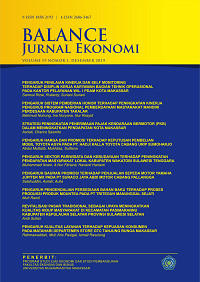THE ROLE OF BAITUL MAAL WAT TAMWIL IN ACHIEVE SUSTAINABLE DEVELOPMENT GOALAS (CASE STUDY OF BMT BANGUN RAKYAT SEJAHTERA)
DOI: https://doi.org/10.26618/jeb.v17i2.6480
Sustainable Development Goals, Baitul Maal Wat Tamwil
Abstract
Prosperity is a condition that is dreamed of by every human being. However, in practice, conditions of prosperity are very difficult to achieve. Many factors become obstacles in achieving prosperity. One of the efforts to achieve prosperity is to support sustainable development goals (SDGs). BMT is one of the institutions that is starting to grow for economic recovery in Indonesia for that BMT can help realize the goals of the SDGs. The purpose of this study is to find out how the role of BMT in achieving sustainable development goals. This research is qualitative research which consists of data reduction, data presentation and finally drawing conclusions. With the object of research, namely BMT Bina Rakyat Sejahtera. The source of data in this study is primary data, namely data obtained directly from the BMT BRS management through interviews. The results of the qualitative analysis show that there are 8 SDGs objectives that have been implemented by BMT BRS. The eight goals are zero poverty, no hunger, good health and well-being for all at all ages, quality education, gender equality, clean water and sanitation, economic growth and decent work, and industry, innovation and infrastructure.
References
Annisa, F dan Suryo Sakti H.2019.SDGs paradigma baru pembangunan global. Jakarta: Spektrum Nusantara.
Moleong, Lexy.J. 2006. Metode Penelitian Kualitatif. Bandung: Remaja Rosdakarya.
Ardista, N. R. 2012. Peran Produk Pembiayaan Terhadap Kesejahteraan Masyarakat Pada BMT Nurul Barokah Sambi, Boyolali. Skripsi, Universitas Muhammadiyah Surakarta
Azizuddin, A. 2014. Peran Pembiayaan Baitul Maal Wat Tamwil Terhadap Perkembangan Usaha Pedagang Pasar Tradisional di Provinsi Yogyakarta. Skrpsi, Universitas Muhammadiyah Yogyakarta
Bungin, M. Burhan. 2005. PenelitianKualitatif: Komunikasi, Ekonomi,Kebijakan Publik, dan Ilmu SosialLainnya. Jakarta: Kencana Prenada Media Group.
Diola, Alfa. 2011. Peran BMT dalam Meningkatkan Kesejahteraan Anggota pada BMT-UGT SidogiriSurabaya. Skripsi tidak diterbitkan.Fakultas Ekonomi dan Bisnis,Universitas Airlangga Surabaya.
Cunningham, E. 2008. A Practical Guide To Structural Equation Modeling Using Amos. Melbourne: Statsline.
Ernawati, R. 2012. Analisis Akad Pembiayaan Mudharabah Pada Bmt Dalam Meningkatkan Pendapatan Masyarakat (Studi Kasus pada KJKS-BMT Ummat Sejahtera Abadi Rembang). Skripsi, Institut Agama Islam Negeri Walisongo.
Saputra, A. 2015. Pengaruh Penyaluran Pembiayaan BMT Bina Ihsanul Fikri (BIF) terhadap Perkembangan Usaha Pedagang Pasar Tradisional di Kota Yogyakarta. Skripsi, Universitas Muhammadiyah Yogyakarta.
Sugiyono. 2014. Metode Penelitian Bisnis. Bandung: Alfabeta, Cetakan keempat belas.
Suryati. 2012. Pengaruh Pembiayaan Mudharabah BMT Binamas Terhadap Perkembangan Usaha Dan Pendapatan Nasabah Mudharabah Di Bmt Binamas Purworejo. Skripsi, Universitas Negeri Yogyakarta.
Wijayanto, J. 2003. Analisis Hubungan Kredit BMT Al-Fattah Terhadap Perkembangan Usaha Kecil Di Kecamatan Susukan Salatiga. Skripsi, Universitas Muhammadiyah Surakarta.
Abdad, M. Zaidi. (2003). Lembaga Perekonomian Umat di Dunia Islam. Bandung: Angkasa Bandung.
Itang. (2015). Faktor-Faktor Penyebab Kemiskinan. Jurnal Keislaman, Kemasyarakaan dan Kebudayaan Vol.16 No. 1 Januari-Juni 2015. Hlm 1-30.
Mankiw, N.G. (2006). Teori MakroEkonomi. Jakarta: Erlangga













